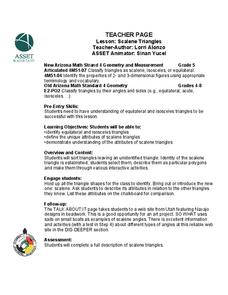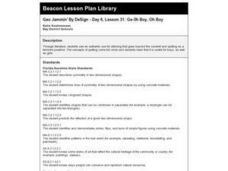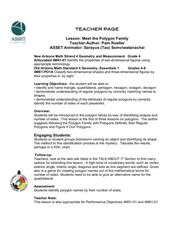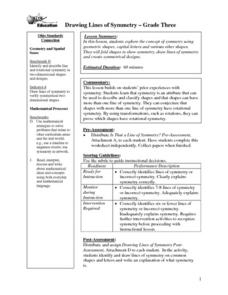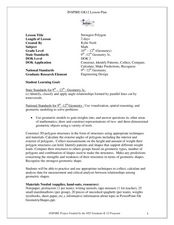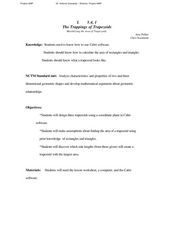Curated OER
Let's Explore the World of Triangles and Quadrilaterals!
Second graders explore the features of triangles and quadrilaterals. In this instructional activity on triangles and quadrilaterals, 2nd graders rotate with their group to five different activities all exploring a different aspect of...
Curated OER
Perspective
Students explain what is near and far in respect to the horizon line on a 2-d surface. They blend and use oil pastels correctly and explain the concept of a horizon line.
Curated OER
Scalene Triangles
Fifth graders identify and classify scalene, equilateral, and isosceles triangles. In this triangle lesson, 5th graders define the different attributes of 3 types of triangles and sort them by descriptions and comparisons. Students...
Curated OER
Ge-Oh Boy, Oh Boy
Students listen to the book, Sam Johnson and the Blue Ribbon Quilt and discuss the art of quilting. They examine various symmetrical sewing designs, and identify reflection pieces, slides, and flips.
Curated OER
Meet the Polygon Family
Fourth graders investigate regular polygons. In this regular polygon lesson plan, 4th graders explore the attributes of different polygons. Students work in groups to complete a KWL chart regarding polygons.
Curated OER
Polygons Defined
Fourth graders explore polygons. In this polygon lesson plan, 4th graders sort polygons according to their properties. Students discover the connection between polygons and the Greek language.
Curated OER
Geometric Glances
Second graders locate, comprehend, interpret, evaluate, maintain, and apply information, concepts, and ideas found in literature, the arts, symbols, recordings, video and other graphic displays, and computer files in order to perform...
Curated OER
Geo Jammin' By DeSign - Day 1, Lesson 6: Quilt Story
Students recognize that quilts are created by geometric components. They examine how quilts are an artistic art form that show the cultural heritage of the people who make them.
Charleston School District
Applications of the Pythagorean Theorem
Use patterns to your advantage! The Pythagorean Theorem allows learners to find missing sides of right triangles. Problems include those with both rational and irrational lengths.
Curated OER
Tiling the Plane
Fifth graders use pattern blocks and triagular grid paper to reivew shape names, be introduced to the concept of a tiling of the plane, and determine which pattern blocks tile the plane. They are asked if they comprehend what a...
Curated OER
Volume, Surface Area for Rectangular & Triangular Prisms
Seventh graders explore the concept of rectangular and triangular prisms. In this rectangular and triangular prism lesson, 7th graders identify various prisms as triangular or rectangular. Students discuss the various shapes of bases...
Curated OER
Drawing Lines of Symmetry
Third graders explore the concept of symmetry using geometric shapes, capital letters and various other shapes. They fold shapes to show symmetry, draw lines of symmetry and create symmetrical designs.
Curated OER
Plane and Solid Figures
Students define a plane and a solid shape. In this geometry lesson, students compare and contrast different geometric shapes as they relate to solids. They name the geometric solids based on their sides and edges.
Curated OER
Art--"Paper Pasting"--Doing Collage
In this art worksheet, students read a 1 page article on the history or art, prepare their background to making a collage, gather basic shapes, create their collage and then add in the finishing touches to them.
Curated OER
Parallel-o-Home
High schoolers investigate the usage of parallel and perpendicular shapes in the real world. For this geometry lesson, students investigate shapes for properties that are related to the real world. They relate all the properties of shape...
Curated OER
Patchwork Math
Students recognize and identify shapes in their environment. They investigate why objects can be composed of several different shapes. They follow a pattern to recreate designs using various shapes.
Curated OER
Surface Area of Prisms
Pupils calculate the surface area of different prisms. In this geometry lesson, students identify the shapes of solids based on the properties of that solid. They calculate the surface area using nets and properties of prisms.
Curated OER
Accenting the Negative Space in Ceramics
Fourth graders apply knowledge of the elements of design and hand building techniques in clay to illustrate the concept of negative space by cutting shapes out of the form to create an intricate pattern.
Curated OER
Classifying Polygons
Students study polygons. In this math lesson, students play a game in which they learn the classification system for polygons. Students identify the properties of quadrilaterals.
Curated OER
Animal Tracks
Students are introduced to the topic of area. In groups, they share various techniques to help them identify different shapes and work together to calculate the area. They use this same knowledge to determine the area of animal tracks...
Curated OER
Strongest Polygon
Students define and identify shapes by name. In this geometry lesson, students construct, identify and compare polygons based on the number of sides. They classify each shape based on their angle sum theorem.
Curated OER
The Android Factory
Students explore the idea that primitive virtual 3D objects can be reshaped to infinitely original combinations using additive and subtractive methods. They create 3-D objects with a computer which necessitates a cooperation of...
Curated OER
Apulian Oinochoe
Students analyze Greek vase painting and create their own vase art. In this vase painting lesson, students analyze the design element shape and the relationship between figure and ground. Students design a figure/ground relationship...
Curated OER
The Trappings of Trapezoids
Students define trapezoids and their shapes. In this geometry lesson plan, students calculate the area of a trapezoid and a parallelogram. They use Cabri software to make investigations.




